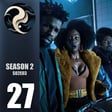Become a Creator today!Start creating today - Share your story with the world!
Start for free
00:00:00
00:00:01

Episode 030 - The Comfort of Strangeness Part 1
In this episode we begin our look at the cinema of the strange as well as pay our tributes to Roger Corman.
Intro clip from Spike Jonze's "Being John Malkovich" from Gramercy Pictures, Propaganda Films, and Single Cell Pictures distributed by USA Films and Universal Pictures International
Opening music: https://pixabay.com/music/id-116199/
Closing music: https://pixabay.com/music/id-11176/
Two Oceans is a creation of Siouxfire & Scrumpy in association with SiouxWIRE
Recommended
Transcript
Introduction and Podcast Theme
00:00:01
Speaker
When you're strange, faces come out of the rain. Whoa! What's wrong, Sims? Who did this thing? The emotions will begin. Who did this thing? Don't! What the fuck is going on?
00:00:27
Speaker
John Malkovich, John, Mr. Malkovich, sir. Mr. Malkovich, I think I can explain. Yeah, explain. My name is Craig Schwartz, and we operate a little business here that simulates for our clientele, well, the experience of being you, actually. Simulate? Yeah, after fashion.
00:00:53
Speaker
What exactly does that mean? Well, it's hard to describe. I want to do it, then. I'm sure that would pale in comparison to the actual experience. I want to do it! But right now, Mr. Hiroshi's in the tube, and he's got about... Get him to do it, Craig. Of course. Right? Right this way, Mr. Malkovich.
Focus on Obscure Films and Roger Corman Tribute
00:01:09
Speaker
Compliments of the house.
00:01:16
Speaker
Welcome to the Two Oceans Podcast, where myself, Sue Fire, along with my friend and unique colleague, Scrumpy, discuss film and other media through a decades-long lens of mass media consumption. In this episode, we'll be starting our look at the obscure and strange, as well as doing our tribute to Roger Corman.
00:01:33
Speaker
This is the two oceans podcast. So fire up your oscillation over thruster and let's travel to the eighth dimension as we pass into episode six, series two. So today we're going to talk about the cinema, the strange, those films that stray off the beaten path and push the limits of logic and conventional narrative to the limits to bring a new twist to an existing genre.
00:02:02
Speaker
whereas my father called them head movies.
Exploring Avant-garde Themes and Fan Communities
00:02:05
Speaker
head movies. Hey, I like that. I like that. That was that covered a pretty broad swath. That could be a psychological thriller of any kind, but basically anything that was nonstandard was a head movie. Oh, yeah, it fits. Right. Looking through, I mean, working through the list today, it's huge. There's no way we're going to cover everything in this episode. But some of it's got I mean, some of the facets that I noticed that common between quite a few are
00:02:32
Speaker
that they tend to have avant-garde visuals, they push the limits of visual storytelling, they mix themes, so you might get horror western and this sort of thing. Changing narrative structure, taboo subjects, pushing the boundaries of censorship, all that good stuff. Psychedelic, blurring fantasy and reality comes up a lot.
00:02:54
Speaker
psychological themes. And one that's kind of meta is the kind of sense of community among fans of these films. A lot of these films would have been forgotten if, you know, people didn't kind of rally together and kind of share their experience around them. Very true. Yeah. And it's a nice counterbalance to the mainstream cinema and the
00:03:16
Speaker
I mean, just to give a little bit of background to our experience, Nolan, as what were your early introductions to weird cinema? I mean, we were in a ripe time for it. Right. And for me, the ripe time was because we had so few channels.
00:03:33
Speaker
on TV is to watch stuff that a lot of these things, especially like as we'll discuss on the Roger Corman bit, a lot of the stuff became public domain really quickly, didn't lock in my rights. And so places, channels, the few channels there were that were hungry for content showed this kind of stuff all the time.
00:03:55
Speaker
And what we're talking about
Impact of Limited Channels on Film Consumption
00:03:56
Speaker
here, a lot of the B movies are what's been referred to as psychotronic on a lot of ways or something. The real exploitation kind of stuff showed up a lot. So when we talked about the Hong Kong or the martial arts episode, we talked, you know, in reference to that monster movies and horror movies in reference to that literal exploitation, exploitation films in reference to that. Like they there was this waiting library of stuff that was intentionally made and put out there for that very reason.
00:04:25
Speaker
you
00:04:25
Speaker
And I mean, I think we were lucky to grow up in a time when we had so little choice. And then there were budget constraints as well. Yeah, exactly. That forced filmmakers to go abstract because they couldn't show the thing, but they needed to kind of convey the stuff. So they ended up doing symbolic stuff, which ended up just being really weird. Exactly. Yeah. And yeah, budgets and time for the filmmaking itself has forced them to be like, OK, well, normally we would like bother to explain this, but now we're not going to.
00:04:57
Speaker
That kind of thing. And so much of that became, though, that it's kind of like a standard. Like you see a movie like that, you know, you just got to the point of accepting that was part of the willing suspension, even if it was laughable. You could laugh at it, though, but you still went along with it. Well, you know, if I was thinking about I mean, a lot of these freaked me out when I was a small child, you know, the stuff that we were asked.
Influence of TV Shows on Bizarre Media Acceptance
00:05:21
Speaker
And to this day,
00:05:23
Speaker
I understand my young self being freaked out by these movies because we had had really far out stuff like things like the Andromeda Strain, Phase Four about the ants taking over, Soylent Green about eating people. And then then, you know, we had Star Wars as well. And then they played, you know, George Lucas's THX 1138, which is a really experimental, bizarre film.
00:05:50
Speaker
And, you know, you're kind of going into it going, oh, it's the guy who made Star Wars. And you're completely unprepared for what you're about to see. And then we had like Twilight Zone, Outer Limits on television, weird shows like The Prisoner, or even the kid shows were pretty strange, you know, right? Had things like Sigmund and the Sea Monsters land at the Sigmund and Marty Croft stuff. Yeah, it was all.
00:06:11
Speaker
Yeah. And again, all from that, but all born from that, like from that particular, you know, born from that same necessity of limits of time and budget that they had. And so they just like, all right, we're just going with it. And we're just going to make you believe that this is real, because we have to believe this is real. We don't, we can't indulge any other way.
00:06:30
Speaker
I mean, you add to that that during that time period, I think a lot of the kind of wives tales and things, you know, we kind of look down at other countries and go like, oh, you've got all these superstitions and whatnot. But we grew up in a time of superstition where like Bigfoot was
00:06:47
Speaker
was real. Like, we not found him yet, but he's real. He was in our backyard. And then you have, I mean, some of these movies that they do appear in the list. One, I remember just terrifying me and it's Dr. Seuss's The Five Thousand Fingers of Dr. T. It is not made for kids. No. And that sounds like such a horror movie title too. Well, it totally is.
00:07:14
Speaker
And then weird stuff like Santa Claus Conquers the Martians, and who knows how that came about. Some costumer was like, well, we've got all this Christmas stuff and we've got some Martian stuff. Oh, I know what we'll do.
Directors Shaping Weird Cinema
00:07:28
Speaker
This forces them to be creative in terms of what ends up getting made.
00:07:36
Speaker
And then also, for me, also early on, the other thing that helped form it, I mean, again, I'd seen a lot of stuff, but not in the way until the Mystery Science Theater started seeing that when it first started. And that helped.
00:07:51
Speaker
crystallize a lot of it. It was like, okay, we can laugh at the, you know, I mean, it is making fun of it, but it is, you know, kind of roughly so. Yeah. With a complete nod to it being entertainment, right? And, and, and, you know, that just, uh, that helped sort of curate a lot of it. And when you talked about the, you know, the, the continuance of some of these movies and such too, you know, it's like, you know, some of them I'd seen before, but some it was like the first time I saw, you know,
00:08:20
Speaker
It conquered the world. The Corbin classic, Lee Van Cleef, that was on Mystery Science Theater. I've watched it on its own since, but that was my introduction. Yeah, it reminded me of stuff that I'd forgotten, like Food of the Gods or Night of the Lepus.
00:08:39
Speaker
you know, really kind of wacky things. And then, and I mean, because of that, I also kind of see there, there's certain, there's quite a few directors that, you know, I pulled together on a list. You got Cronenberg Lynch, recent people like Jorgos Lanthimos, Al Jodorowsky, Leos Carax. I mean, there's just tons. Ken Russell, you know, I could go on and on. But then there are some of these directors that at,
00:09:06
Speaker
I think to the layman would seem weird. So you're Tim Burton's M. Night Shyamalan, Wes Anderson, that sort of thing. But I think if you were to read the script, you'd go, that script is a weird movie. But I think the way that they approach it is so standard.
00:09:25
Speaker
that I don't quite classify those as weird movies. Do you know what I mean? They lack that weird atmosphere that you get from them. Weird for people who don't know what weird is. Right. Right. Normal people. Whatever those are. Wouldn't know weird if it bit them in the ass. I mean, there's some people that think the Truman Show at Forrest Gump is weird. You're right. They're not weird.
00:09:50
Speaker
The other thing that we had as well is,
Preservation and Influence of Weird Cinema
00:09:53
Speaker
especially through the 90s and going into the naughties, we had things like MTV doing experimental animation and television. We had Rod Serling with the Twilight Zone. Rod Serling definitely had an influence on films because you could see that kind of template from Twilight Zone being used in movies like Seconds. That's totally a full-length feature
00:10:18
Speaker
Twilight Zone episode. And same, I would argue with Jordan Peele's Us. That's a full length Twilight Zone episode, easily. Oh, totally, totally. And then more recently, we've had Adult Swim as well, kind of championing the kind of weird, more on the humorous side.
00:10:39
Speaker
still there, and then Mystery Science Theater, which you already mentioned as well. So, you know, it'll never be mainstream because the weirdness kind of shifts. But I think the one thing that I noticed in the list is I think there's weirdness kind of going back that has never been topped, right? You would think that it's a weirder and weirder, and it doesn't, you know? Yeah, you think with permissiveness and changes in
00:11:05
Speaker
Oh, you know, elimination of the Hays Code and modern techniques and sensibilities and everything's like, oh, these movies are all to blame. It's like, you can go back and trace some stuff to it.
00:11:21
Speaker
Like you mentioned on your list, Todd Browning, I mean, nothing tops freaks. Well, yeah, no, absolutely. I mean, absolutely that now people, I mean, it makes people uncomfortable. And it's like, you know, you know, it's like, well, you know, not one of those like, oh, well, it was a thing at the time. No, no, it wasn't, you know. And I like, you know, with Del Toro's remake of of. Oh, and I want to call it the the Alley Nightmare Alley. Nightmare Alley.
00:11:51
Speaker
you know, another, you know, same sort of thing. He's like, very much obviously, you know, had that same influence on him. But, you know, that same thing, it's the same story. Like, it's just, you know, polished up a bit. But it's just as, you know, it's just as, you know, disturbing and weird and doing what it's meant to do as the original was.
00:12:13
Speaker
I think this kind of gets into something I've talked about a lot in terms of how people watch movies. Like one, you need to kind of give yourself over
Roger Corman's Impact and Methods
00:12:22
Speaker
to a lot of these movies and just trust them. Needs your concentration there. And then what I'd also say, and this is especially for sort of cinephiles. People are like really into the movies. They feel like they need to analyze it.
00:12:35
Speaker
Especially coming from our position and doing a podcast is sometimes I feel like it's a puzzle to be solved. It's infuriating when you come out and go like, I don't get it. Sometimes the experience is what you're meant to get. It isn't something where you can logically piece things together unless it's a murder mystery.
00:12:59
Speaker
So you got to live in the moment. It's forcing you to live in the moment. You've got the movie for, you know, hour and a half, two hours. You just got to focus on that screen and just let it carry you and, you know, leave all the thinking and judgment until after the movie, you know. But you've already sort of mentioned Corman, who sadly passed away in the last week. Now, I think a lot of people who aren't movie buffs probably wouldn't have heard of Roger Corman.
00:13:27
Speaker
But yeah, I think maybe if we begin by talking a little bit about its impact, because very similar to the Shaw Brothers during our kung fu episode, Corman was prolific. But unlike the Shaw Brothers,
00:13:43
Speaker
He was so diverse in his output, doing Westerns and horror, science fiction, counter culture, teen melodrama. And also his background is that he had an eye for talent. Francis Ford Coppola, Jonathan Demme, Martin Scorsese, Joe Dante, James Cameron.
00:14:06
Speaker
actors like Jack Nicholson, Peter Fonda, Dennis Hopper, Bruce Dern, Diane Ladd, William Shatner, right? You know, they all kind of cut their teeth with Corman and, you know, all these names to this day are, you know, well known, right? Well, and it was a film school that wasn't theory, it was, you know, applied. It was like, he's like, okay, here's $50,000, you've got three days.
00:14:34
Speaker
Right. If you could do that, you can do anything. Like, you know, it's kind of a, like, you know, that's going to, it's right in the deep end of the pool and you're going to have to make creative choices. You're going to understand how it's a collaborative process. You're going to all have to, everyone has to work together and understand the assignment, you know, otherwise it's all going to fail and you're, and you can't go for a budget because there is no more budget.
00:14:55
Speaker
You can't take more time. There is no more time. Yeah. I mean, this is the thing. He's been really open, you know, to his dying breath in supporting sort of new filmmakers as well.
Modern Film Challenges and Distribution
00:15:06
Speaker
Kind of pointing out that nowadays, you know, making the films isn't the problem. It's cheaper. You could do it on your phone. You know, it's cheaper than it's ever been. It's the distribution that
00:15:17
Speaker
it becomes more difficult, right? Because a lot of the kind of big international markets where you'd make a lot of money, they don't get proper distribution. I mean, I'm even sort of thinking one of the films I wanted to put on the list was Bow is Afraid, right? It had a showing of about a week here in the UK, in my town. I missed it. And it's not being released on to Blu-ray over here. I know it's released in the States.
00:15:43
Speaker
until August, so nearly a year after its theatrical release, is it getting, you know, a sort of home video release, which is crazy. And it's not on any of the streaming platforms either. So weird. But yeah, then. But you know, Korman also mentioned in this interview with BFI that, you know, you also have opportunities with things like YouTube and podcasts and all that other sort of good stuff. But yeah, do you have any sort of films you want to highlight from Korman that stand out for you?
00:16:14
Speaker
Well, you know, a lot of them that, you know, were constants, at least, again, in that same model of being cheap and easy to show because they were also safe to show where his Edgar Allan Poe adaptation that he produced in the 50s. House of Usher. And those always showed up like every October. So it was almost like annual viewing. But, you know, follow the House of Usher, or I think it is called the House of Usher, Mask of the Red Death.
00:16:39
Speaker
little shop, the original little shop of horrors, pit in the pendulum, pit in the pendulum. Yeah. All those were like a constant, you know, always there sort of thing. And then I know they were all created
00:16:54
Speaker
under very low budgets, but Little Shop of Horrors is the one that I know the statistics on, which was it was shot in two and a half days for $30,000. Yeah.
Celebrated Directors and Foreign Film Distribution
00:17:04
Speaker
Yeah. And it looks like it, but it also has there's you don't have time to get into your two head about it. So it becomes almost a sincere approach to it. You know, it's the same sort of thing with another filmmaker we have on our list of is Ed Wood.
00:17:20
Speaker
who just may, you know, there's a thing that at least, you know, are they good films? No, but are they good to watch? Yes. And that's part of it, right? That's part of the appeal, right? Is that the fact that they're not overblown, made by committee, overproduced, they're never overproduced. Exactly. But I think the big thing with their films as well, and especially sort of Ed Wood,
00:17:47
Speaker
is he didn't believe they were bad movies. There's sincerity to it as well. In fact, earlier today, I watched Glenn or Glenda, which is insane. It's insane that came out in 1953. He's just basically doing a treatise about just be open and nice to people. They're not harming you kind of thing. Talking about transvestites in 1953,
00:18:16
Speaker
I mean, it is freaking weird that, you know, you've got that Bela Lugosi and Stampedeing Buffalo and him shouting, pull the strings, which is a great scene. And Tim Burton said, Burton's owed to Edward. Yes. Yeah. And also, Korman, speaking a little shop of horrors, did love the musical translation that Frank Oz did. So, yeah, he it's it's quite a legacy.
00:18:41
Speaker
Well, and there's always the thing too that he was such a supportive force, even by some kind of proxy or something like that. And just going for the best deal and things like that and trying to secure that. That was the most recent, the last interview we did with Joe Bob Briggs last October when he started the sword and sorcery genre.
00:19:04
Speaker
in the 80s or late 70s, early 80s and doing them all in Argentina and basically saving the Argentinian film community as an actual production or actual entity simply by just going there because it was cheap and they would give him the control that he wanted.
00:19:23
Speaker
And, you know, kind of despite, you know, he wasn't trying to do it altruistically. It was like, no, it's cheap. And they're down on their luck. And I'm going to take advantage of that. But we're both going to come out of this winners. I mean, this is the other thing that kind of would surprise people because as you need did these kind of, you know, the hammer type horrors in the 60s and he did a lot of schlock for sure.
00:19:45
Speaker
But in the early 70s, he was bringing in films from Ingmar Bergman and Francois Truffaut and Peter Weir and Federico Fellini and Akira Kurosawa. He was bringing these films and that foreign films ended up having a distributor in the States through Corman.
Transition to Streaming and Film Preservation
00:20:07
Speaker
And that was a big deal. And not just in terms of distribution and at that time,
00:20:13
Speaker
happen to capitalize in on this new thing of the home video market. Because I remember a lot of those foreign films you mentioned, a lot of the ones he produced, you could find those at every video store you went to. Everybody carried it because it was like, oh, we need foreign stuff here. I guess people like this. I remember seeing those boxes, the artwork for Amercord, Tindrum, Fantastic Planet,
00:20:40
Speaker
cries and whispers alongside, you know, death race and suburbia and piranha. And, you know, all those, all of those, and those are all him, like in some way or another, you have Roger Corman to thank or blame or both for those being available and again, being able to capitalize on the new technology.
00:21:04
Speaker
And him, I mean, straight to video, when that became a thing, you could tell, you get to see his eyes light up. If he didn't come up with that concept, I don't know who did, but it seems so perfectly suited because then so much now that we, you know, is laughing at, you know, now is, well, we call it, I still call it straight to video, even though anymore it's straight to streaming, straight to, I don't know what you call it, but straight to, you know, with the, straight to, yeah, like with the whole Sharknado series.
00:21:29
Speaker
Right. Again, who's behind it? Roger Corman. That sounds like a Corman. Oh, yeah, there he is. You're welcome. Got a thing. He was able to capitalize on that because he saw it as a business, right? He understood
00:21:44
Speaker
the business side without sacrificing anything to it being the business, right? I mean, every artist that worked with him pretty much, unless they only worked once or got fired on the set, pretty much really enjoyed working with him because of what they learned. Was it the best experience? Well, I don't want to do that again. I'd rather have more money and more time, but the lessons learned and the support they got and
00:22:10
Speaker
the opportunity they were given and everything. So it'd be by this one guy who just had a very singular vision, but a very broad approach. And I think to a certain degree, Martin Scorsese has carried the mantle in terms of that kind of support because Scorsese has been so involved in preserving and making available a lot of film distribution. That's what I was going to say. Yeah, serving and accessibility.
00:22:37
Speaker
Yeah. Yeah. Very much so, I think. And one other person as well is that 1958's Stakeout on Dope Street, I believe, was one of Irvin Kirshner's first or early movies, and that was produced by Corman as Irvin Kirshner, of course, directed Empire Strikes Back, which is the best Star Wars hands down.
Julie Corman's Contributions and Film Legacy
00:22:57
Speaker
Yes, indeed. It's me otherwise. And also worth noting, he also, just in fairness to the Corman name, Julie Corman, his wife,
00:23:06
Speaker
was there for a long time as a producer as well. And, you know, Roger Corman obviously gets the, cause he was the face out there, but Julie Corman was no slouch. Came to producing and having that same spirit and keeping that alive. And I imagine she still will, you know, no reason to stop and they haven't, but, and you know, he would be the first one to thank her or put her name first in terms of that, you know, notoriety or infamy or famous, you know, whatever you want to call it.
00:23:34
Speaker
of just how crazy it could be, but how supportive and also sharing in the vision, and just as driven as he was. I think her name belongs up there just as much as his, because she was there for the majority of his 900 films. I think she was quite happy to remain more anonymous, but she was active, for sure.
00:24:02
Speaker
And in 2022, he managed to get on the last sight and sound survey as well. His top 10 films were Chinatown, Citizen Kane, Doctor Strangelove, The Godfather, La Dolce Vita, Lawrence of Arabia, Rashomon, The Seventh Seal, The Tindrum, and War and Peace.
00:24:26
Speaker
That's a pretty good list. That's a solid list, isn't it? And that's the thing, the Corman stuff especially, but it's the weird films as well. Corman's again, I think, responsible for a lot of my love for cinema because you understand how to marry passion with the business and delivering something and how to get out there and sort of things. It kind of blends everything together nicely, right?
Artistic Value and Cultural Impact of Corman's Films
00:24:47
Speaker
But going through film school and things like that, a lot of people are just so dismissive
00:24:52
Speaker
of him or his movies because, you know, we're in film school, it's not art. I'm like, how is that not art? Let me tell you. Let me tell you about what breeds, you know, necessity in breeding this, you know, what you consider art and how art is made. And, you know, so, you know, there was a weird thing, you know, that weird tension, right? But that list of, you know, his list of top 10 movies, like any arts, you know, any film school student would, you know, be like, absolutely. Like there would be no disagreement with that list.
00:25:21
Speaker
He also would be sniffy, obviously, given kind of the films that you've created as well. It kind of goes back to what we were talking about in the introduction for going to weird movies, is expanding your horizons. It's not about sort of narrowing it, which I think a lot of film scholars or film snobs will tend to do. Yeah, they get up their own ass and there's not a lot of light in there.
00:25:46
Speaker
Yeah, yeah. I mean, it's funny because on some of the movies, I've done a little bit of background and, you know, movies that I like. And I can I can tell in the reviews that the people who reviewed them didn't get them like they completely missed the mark. And it's amazing to see these scholars completely not getting it, even though it's, you know, clear as the nose in your face.
00:26:12
Speaker
Cool. Well, shall we start cracking into some of the strange movies then? I suppose that would be fair. I suppose. I got a clip for us here. I have no idea where this will lead us, but I have a definite feeling it will be a place both wonderful and strange.
00:26:35
Speaker
So we're starting with the bat shit and humor of the absurd category. Yay. Yay. I mean, these categories are pretty arbitrary. So yeah, this is our best of kind of throwing things together. Yeah. And trying to categorize these movies is not easy.
00:26:54
Speaker
But not easy, but it's also like, so it's kind of fun too. It's like, yeah. Like when you start looking at splitting those hairs, it's like, okay, really, what would this be? Like, where would, you know, you could have something like, you know, in this, you know, just the, again, the humor of the absurd or they're absurdly humorous, I think would be another good way to throw it on. Yeah, you could flip that and it wouldn't take anything away. Exactly. So, you know, you'll mention like, they had wood stuff.
00:27:22
Speaker
would definitely fall into this, the Ray Dennis Steckler stuff of the incredible mixed-up zombies or creatures who stopped living and became mixed-up zombies, you know, or a rat-fink-a-boo-boo. Rat-fink-a-boo-boo because there was a production problem with the printing on the label and the and got left off and it became A. So it's supposed to be rat-fink and boo-boo, but it's now known as rat-fink-a-boo-boo because of a mistake.
00:27:48
Speaker
which just makes me love it even more, right? But you've got those in with something as far as being John Malkovich, or the Clone Tyrone, or the Love Witch, or something as elegiac as you put on here, this is like, Leonor will never die.
00:28:09
Speaker
or, you know, but then, you know, bump that up against Kung Fu Hustle or Haosu. We can totally tell that they're the kind of breaking the rules here because as they're not repeating the template again and again, it's all very different. You know, they don't... They're all frighteningly original. Yeah, there's nothing that there are, but without being like completely experimental, right? Like there's things that are, there's tenants that are intact.
00:28:38
Speaker
that at least you can use to ground you. Like you said, when you're talking about needing to give yourself over to them. One of my favorites for doing that is early Lars von Trier film Europa. At the beginning, Max von Saito is the voiceover and he's the hypnotist. And he starts counting you down and counting you in. That's what he's doing to get you into the movie. If you don't get hypnotized, that movie is going to be pointless to you. There's no point in even watching it.
00:29:05
Speaker
I mean, you've got to allow yourself to enter into that to be like, okay, yeah, I feel okay. Let's try this. Yeah. Go for it. I'm trusting you. Exactly. I mean, that is a great example. I'd also, I mean, in that and the beginning of Jonathan Glaser's Under the Skin, which kind of opens up with this black screen and these sounds, and then eventually you start seeing these abstract images that kind of pull you in and
00:29:35
Speaker
It's, you know, within about 30 seconds, you're in that movie, like you're in the movie. If you're paying proper attention, you are. Exactly. I would say probably the best example of it is the beginning of Blue Velvet.
00:29:49
Speaker
you were just lulled right into this comfort zone and then right to the cover ear. And it just like, boom, there's the hook. That's laying the hook. Like, yeah, oh, yeah. I mean, that's just masterclass. It's like, that's how we talk about sticking the landing. There's also kicking open the door, right?
00:30:12
Speaker
That's a good point. Yeah, actually, it'd be interesting to make a list of some of the best openings like that. Right? Yeah. Right. So first we have in our list and unsurprisingly, it's not the first that we have from Japan. It's Ishe Mikkei's, the happiness of the categories, 2002. I mean, it's part of a really small group of musical comedy horrors out there, you know?
00:30:40
Speaker
Well, at the time, I always joked, it's the best Japanese zombie horror musical out there, this being the joke being it was the only one. Now that's not true. It's like there are more. There are more zombie musicals at least, if not necessarily Japanese that come from all over the place, right? There's more than one now.
00:30:59
Speaker
But the thing about the movie, interestingly, I found out that it's based on another film from 1998 from Korea called The Quiet Family, which I also want to see because it's about a family who own a hunting lodge and their customers just keep dying.
00:31:16
Speaker
Like, by accident, right? But then they just can't help it. And Takeshi Amike was as inspired by that. But, you know, that wasn't a musical. This is, you know, like, Evil Dead means... But it didn't have claymation in it either.
00:31:32
Speaker
Well, yeah, it also didn't open with the line, my uvula. Claymation had stolen it. But at the same time, at its very heart, I mean, it's a funny movie, right? I just find it tons of fun. And the family for all its flaws, I found really kind of likable and relatable, you know, in the middle of all this chaos. The family made sense, you know?
00:31:57
Speaker
But yeah, and that's, you know, it's one of the thing, again, and it's also something to come back to for this whole genre, is that there is usually something at the core, something that's like it comes back, you know, and oddly enough, a lot of Miike's movies come back to family, and the friends you make as family and things like that, that being so important, and what it can make you do or put you through. Right. Another one, you know, companion to that, you know, obviously, because it
00:32:20
Speaker
it deals with a family, be Visitor Q, which, Happy's got a queries I could show to anybody. Visitor Q, probably not, you know, on your, I'm not going to start you off watching Miike movies with that one. They might, you know, remove themselves from any chat groups they share. They might remove themselves from life, you know, just after that one.
00:32:41
Speaker
Yeah, but it's the same idea, right? And again, a lot of these movies, I think, regardless of just that particular director, there is some kind of core appeal to that. There's something, again, we talk about that grounding or something, the hints of familiarity, whether that's a narrative or such too. But I think thematically, there's some things, even when they get really out there and seemingly really loud, and I think that's what separates the weird from the purely experimental.
00:33:06
Speaker
I mean, the interesting thing is a lot of these movies were reviewed quite badly on release, like people were not ready for it. Right. Tends to happen. And then steadily over the years, its stock has been going upwards.
00:33:20
Speaker
Next one, we stay in Japan for Hitoshi Matsumoto's Big Man Japan from 2007. It's kind of what superheroes, what flight of the concords or spinal tap is to music. All these questions that you might have about when the Hulk gets big, how do his clothes expand with it?
00:33:46
Speaker
this movie actually has an answer. It's kind of ridiculous, but it has an answer. But again, like the previous movie, as crazy as that is, our protagonist has relatable family issues going on. He's not paid enough. He's got a hard time living up to his family's reputation. He's got very human issues. It's not
00:34:08
Speaker
you know, some kind of weird sort of made up problem. He's got problems that, you know, people can relate to. And the movie as a whole, aside from the fight scenes, which are obviously kind of kaiju monster fights, the rest is actually pretty grounded, considering. Surprisingly so, yeah.
00:34:32
Speaker
Right. And I'm going to try to keep things on a nice clip here because I think some of these movies are going to have a bigger conversation than others. But next we've got first to Spike Jones's Charlie Kaufman's contributions to this list being John Malkovich from 1999.
00:34:50
Speaker
Absolutely. And again, it's another one that's just consistently funny, but nails that grounded almost downbeat tone through the movie. Well, there's a hint of the tragic that follows, that a lot of these fall into as well, where something is broken and they're trying to fix it and they may or may not succeed. Yeah. And that's the beauty of a lot of these, or at least the appeal, what I call the beauty of the appeal for me and a lot of them is that, you know, maybe they don't.
00:35:18
Speaker
It doesn't have to. Well, not everyone in the movie gets out. Exactly. Exactly. And some of them shouldn't. Exactly. There's that negotiation that goes on in the narrative. And again, it's not just like, oh, it's just weird. It's like, well, no. And I'm like, oh, isn't that a funny premise? But they get past that. That's where you start. And then it keeps going to something else. You can't summarize by saying, this movie is about X.
00:35:47
Speaker
that kind of thing. Being John Malkovich definitely does so, which I guess originally it was supposed to be Steve Buscemi, but it couldn't work it out. It was a story I read once, so it became John Malkovich, which I don't know, somehow works even better. Well, initially, the script was just being rejected. Kaufman just couldn't get anyone to pick it up, but everyone was reading it. It was really popular and is getting passed around.
00:36:14
Speaker
And eventually it got sent to Francis Ford Coppola, who then passed it on to his daughter's then boyfriend, Spike Jones. So it was just through this kind of networking. But no studio wanted it, but everybody wanted to read it.
00:36:31
Speaker
And they also didn't have sign off from John Malkovich beforehand. They were kind of banking on that one, which is pretty awesome. I'd also say that some of the weirdness is done so well in so matter of fact in the movie, like the weird office at Lester Core on the seven and a half floor.
00:36:52
Speaker
It's weirdly familiar, you know, from the ridiculous onboarding video to the incompetent management. You know, the fact that you have to stoop in the office is a nice sort of metaphor for having to go to work. It's also great. Yeah, and a lot of that's very similar to like Lanthamos, like in the lobster. Oh, totally, totally. Something like that, the way the place, the way the premise operates it so matter-of-factly.
00:37:18
Speaker
has that same sort of, again, humor of the absurd. You're right. The other thing is at the time, it was pretty wild to see Cameron Diaz playing a dowdy character. Everything kind of took you off balance when this was first released.
00:37:38
Speaker
And interestingly, Jonathan Romney at Sight and Sound described it as, at once, a data screwball comedy, an inquiry into the nature of personality, a metaphysical conspiracy story, and a comment on the way that we invest our own desires into public figures, hollowing them out into blank receptacles. I thought, wow, okay, wow.
00:38:03
Speaker
I mean, that doesn't sound like a movie you'd want to watch, but it's such a watchable movie. Indeed. I mean, basically, Kaufman said that the story originated from, he just had this idea that he wanted to make a story about a man who falls in love with someone who's not his wife.
00:38:23
Speaker
And then all this other stuff just came up around it. Sure. Which is wild. And John Malkovich is so good in it. And there's so many good quotes in it. I mean, everything about that, especially the first half of the movie is just laugh out loud funny from the secretary who couldn't understand what he was saying at any point. And then, you know, the boss who thinks he's got a speech impediment because the secretary doesn't understand anything. It's fantastic.
00:38:49
Speaker
Now, in counterbalance to this one, the next on the list is Dream Scenario, which has just come out in 2023 from Christopher Borgley, I believe, with Nicolas Cage and Julianne Nicholson. And there's a reason I put this after being John Malkovich, because it has a lot of the John Malkovich vibes to it, and there are great performances, and the tone is good.
00:39:15
Speaker
But I couldn't help but think of being John Malkovich and what a director like Spike Jones or Michelle Gondry or Jean-Pierre Genet might have done with this. It's this guy's first movie, by the way. So, I mean, he did a good job considering that this is his first feature. And again, it deals with the same idea of the experience of fame or unexpected fame. But another movie that I'd watched in this last week,
00:39:44
Speaker
was Bunuel's The Discrete Charm of the bourgeoisie. And that went so balls to the wall in 1972 in terms of messing with, is this a dream? Is this not a dream? Are we within a dream? That this movie felt
00:40:02
Speaker
almost quaint, you know? Even the way that he sort of envisioned the dreams is like someone's having a dream about forest and these wacky looking mushrooms on the trees. It just felt very uninspired, you know?
00:40:19
Speaker
Yeah, I mean, it's not a bad movie by any means, but it's not the classic that I was hoping for. You know, I had high hopes for it. And that Boonwell, we showed that in film history class in one of the terms of that later stuff, and nothing threw off the normies more than that, with the change in the actresses.
00:40:41
Speaker
Right. The actress swap that they don't call out. It's just like, now it's this actress, you know, who changed this? Yeah. And oh, the people were losing their fucking minds. It was great. But you can't do that. Why not? It's like, you know, it's just a lot of the that's the beauty of this whole, you know, a lot of this is just is really a binary switch in there. You either accept that anything is possible or then you accept that nothing is possible. And it all has to be like crap, like gladiator or something like that.
00:41:11
Speaker
I mean it out, Inception's Inception. Do you know what I mean? Think about it. It is the Inception, right? It is the Inception. Inception, the movie would be a pamphlet to be like, okay, here, come this way. Right. Anyhow, dream scenario, one of the recent ones now in home release. It's okay. It's okay. Operators are standing by. Operators are standing by.
00:41:36
Speaker
And we're going back to the 80s now, 1984, specifically with W.D. Richter's Adventures of Buckaroo Banzai Across the Eighth Dimension. Yep. Oh, yes. Back to teenage years, when I was like, whoa, it's got Peter Weller in it. Awesome. What the hell is this? This is this is great. But what? Huh? What did I just watch? I don't know. But I had a good time. You know, that's where you are. Exactly.
00:42:02
Speaker
I mean, it's a funny one because I realized while I was thinking about this movie today, because I mean, I still don't know what to write about this movie. The ending is very much like the ending to The Life Aquatic with Steve Zizou. And both films feature Jeff Goldblum as well. Yeah, true, also. So I've been meaning to rewatch The Life Aquatic with Steve Zizou, which I love. I love that movie. It's one of the Wes Henderson ones that stand out for me.
00:42:31
Speaker
to see if there's anything else that harkens back to Buckaroo Bons. Interesting. I mean, my biggest... Go ahead. Oh, I was just going to say, this is one of the movies that went through production hell, because the producers wanted something like Indiana Jones. Jones, yeah.
00:42:50
Speaker
And they weren't going to get it. Yeah. So so it did not have a pleasant creation. And, you know, I think the producers were just kind of hoping that the the writer and director would eventually give up on some of the weirdness. But, you know, and so doubling down on it. I think they probably doubled down. Yeah. You know, my my only complaint with it is that we were promised a sequel at the end of the credits. Becker Bonsai versus the World Crime League. And we are still waiting.
00:43:20
Speaker
40 years later, we're still waiting for that sequel. It could still happen. I mean, the title is amazing, isn't it? Right. It said Buckaroo Bonsai will return and Buckaroo Bonsai against the World Crime League versus the World Crime League. So I'm just I'm just putting that call back out there. Some of us have not forgotten the North remembers. We have not forgotten. And we are owed this. And if you did something like, I mean, think it's what you could do with this now.
00:43:46
Speaker
I mean, do it on, you know, some Netflix, Amazon, I don't know, one of you guys, they have too much money, more money than brains. Just give somebody the idea. I mean, you're not going to make a bad version of it because you can make something that, you know, nobody knows what's going on and just be like, oh, well, at least it's true to the, you know, true to the spirit of the original. You know, the possibilities are endless and the time is ripe.
00:44:07
Speaker
I mean, this is the thing. So Peter Weller was recently in Guillermo de Toro's Cabinet of Horrors in one of the episodes. Jeff Goldblum's still working. Clancy Brown's still around. So, you know... John Lithgow's still around. Is he? Is he?
00:44:23
Speaker
I don't think he has. Let's go. Let's go. He's not dead. Let's go lives. Even Ellen Barkin's still around, I think. Yeah. Ellen Barkin's around as well. Yeah. Yeah. I mean, you could get pretty much involved. And I think in the... I mean, it ain't really, you got enough there, I think. Yep. Yeah, you have. Right.
00:44:45
Speaker
Okay, we're going back to Japan now. We're going to go real weird again, which is Funky Forest, the first contact. I had not heard of this one. Okay, this is from a director called Shunichiro Miki. And this is the one that I was referencing earlier, where reviewers just didn't seem to get it. And there are a lot of reviews on Rotten Tomatoes.
00:45:08
Speaker
I looked specifically at the starred reviewers, the professional reviewers, and there were a lot on there that thought, because it's a series of sketches, but they thought they were meant to be traditional comedy sketches, because they were talking about Saturday Night Live and stuff.
00:45:29
Speaker
all of this, and that's not what it is. It is not Saturday Night Live. Each sketch has its own tone, its texture, and most have something off the charts strange in it. I mean, it is an experience, right? If you watch the trailer for it, don't worry. It's not going to spoil anything. There's not too much to spoil.
00:45:52
Speaker
I mean, Charles Mudetty, who's a reviewer at The Stranger, the Pacific Northwest, he got it. He understood it. But you have different episodes with titles like The Unpopular with Women Brothers, and two of them are Japanese, and one's this little white kid.
00:46:11
Speaker
It's just not explained. He's speaking fluent Japanese, but they're all meant to be brothers and they all look entirely different. And you've got the babbling hot spring Vixens is one of it. And these clips keep coming back, so you get a part and then it'll go to another clip and then that part will continue later on in the movie.
00:46:32
Speaker
But I don't think they're meant to be punchlines. There's a comedy sketch at the beginning, but I think it's kind of satirizing the comedy on Japanese television, right? And that's not meant to be the joke. It's more meta than that, but it just felt like a lot of people
00:46:53
Speaker
Didn't quite get it stopped right there. Yeah, didn't yeah. Yeah. Yeah, and then Some of them some of the clips will just suddenly end and you'll be like what what? Why did it end there? What is going on like everything about this movie wrong foots you but it's it's a fun experience and it's very similar in terms of that experience to the next one in our list, which is Nobuhiko Obiyashi's house or how sue from 1977. Oh, yes
00:47:23
Speaker
Yeah, not in that house with the greatest American hero. Yeah. Good, but for different reasons. No, this is much different. This is another Japanese fever dream. Yeah. Oh, man. And is it? But it wastes no time in this movie. Like, it takes like a half hour to me whenever I watched it and I've seen it more than once.
00:47:46
Speaker
Yeah, yeah, yeah, it does. And yeah, it's just so all over the place, but not, you know, it's a, it's like, yeah. Right. And I mean, it is, you know, a haunted house movie at its core. Yeah. And some of the techniques and things like that are straight out of something you would see from a, a William Castle production or something, you know, the tingler, uh,
00:48:12
Speaker
House of Wax or something like that. It very much has that nod, I think, to those films, but also dreading its own road. Let's put it that way. Well, Obiyashi, so first of all, Toho wanted a film in response to Jaws, the success of Jaws. They wanted their own version of Jaws.
00:48:36
Speaker
this was it. Nobody wanted to take it. Obiyashi worked with his pre-teen daughter, Chigumi, to write the script for this. And you could tell. Definitely. She was a big part in writing this. But then Toho gave the green light. No one wanted to direct it, so he directed it himself because he wasn't really kind of a
00:48:57
Speaker
director, really. But yeah, this is Japan's response to Jaws and that makes it, takes it to a whole other level. I mean, the only thing that I can think of that is related to Jaws in this movie is the piano.
00:49:14
Speaker
Yeah. Yeah. Yeah. And that's a leap, you know? Yeah. Give me a second. Yeah. Okay. Let me just calculate again. Exactly. Constantly. Well, that's the beauty of it. And like a good horror movie, much less, you know, anything else, it keeps you on your toes. You don't get to settle in. Sure. Yeah. Basically, everything's up for grabs.
00:49:39
Speaker
You see each person go off. Oh yeah, totally. And it's each person goes down their own thing, you know, like, okay, what's going to be, what's awaiting this person? You know, again, that's very standard, right? That's right. But how that's going to play out and what it's going to be by the end is going to be something very, very different.
00:49:55
Speaker
I don't expect a traditional anything, but you're not lost. I mean, the fact that it hangs together is something. Right. And I know about this with tone going badly wrong. So this week I watched the film from Alexander Aya Horns with Daniel Radcliffe and
00:50:15
Speaker
It's full of good ideas, but it doesn't know if it wants to be a comedy, if it doesn't want to be serious, it doesn't know that the tone was all over. I mean, in Daniel Radcliffe's performance, it's great in that mood. And it is okay. But it had all the makings of something much, much better.
00:50:35
Speaker
in probably more capable hands. Because the tone was just, you know, and I've got so much respect for directors who managed to keep it together, like being John Malkovich, you know, having that comedy not going too far while still having some sort of menace or Brazil, you know, that's able to mix all those things. But yeah, this felt, have you seen it? Have you seen fit horns? Yes. Yeah. Yeah. And I was pretty underwhelmed.
00:51:05
Speaker
Yeah, yeah. And I thought it was promising in the first half hour, but then suddenly you had something that was obviously meant to be a joke and you're like going, why? Why are you doing this? And then it would get deathly, darkly serious with someone giving a
00:51:23
Speaker
very heavy monologue right next to, yeah, just very weird. Right. Speaking of weird 1974s, John Waters, and it could be any John Waters movie really. We got Female Trouble on here with Divine and Me Stole and all the rest.
00:51:42
Speaker
This was on a Christmas list, actually. It opens with divine Don Davenport kicking off after not getting her cha-cha heels for Christmas. That's how the film starts.
00:51:57
Speaker
And it's another one that's about fame, funny enough. Sometimes it's up quite a bit. Yeah, oddly enough. And yeah, I thought it was, yeah, that one's just so, that's the one you'd always kind of, that was like a comfort movie. It's like, oh, let's go back and watch, you know, Female Trouble. So it's like something, you know, people are going to have a copy of that. The right people are going to have a copy of that and Suburbia and Evil Dead 2.
00:52:17
Speaker
Well, that was another one. That was a staple in the video shops when you go there. They'd have all the John Waters movies, or they'd have a section for midnight movies, and they'd be in there. Yeah, exactly. And yeah, and for good reason. Right. And next on the list, I'm not going to go over this too much because we talked about it earlier, is Daikon Tyrone 2023 from Jewel Taylor. It's another one. It's not
00:52:42
Speaker
Overly strange, but strange nonetheless. It's one of those rare black science fiction movies, you know? You don't get a great deal of... It's a unicorn. Deal with those. Yeah, yeah. And after that, we go to France for 2009, Stéphane Obiez, a town called Panica, which is animated. Have you seen it?
00:53:05
Speaker
not for a long time, but I have seen it. Yeah. I mean, it's so, so entertaining and I recommend watching it in the original French subtitles because it just adds a whole other level of, I don't know, just hearing the, he, hon, he, hon, he just makes it that much more funnier to me. I've seen it a few times and it works with kids as well, but you know, you appreciate it as an adult.
00:53:25
Speaker
I mean, it's reminiscent of like old school slapstick, but without any malice, right? Its world is just like inventive and refreshing, kind of like Aardman.
00:53:37
Speaker
maybe a little bit more adult than Aardman, but like I said, it doesn't have any sort of malice in it, you know? And right, next up we go to Hong Kong for Stephen Chow's 2004 Kung Fu Hustle. And again, you can also pick most any Stephen Chow. Oh, totally. With the comedy of the absurd, right? Chow Lin Soccer. Because yeah, they still mix in and it's like, okay, now we're going to have a dance number and now we're going to have this.
00:54:06
Speaker
Or you have Looney Tunes physics mixed with Yakuza doing dance routines. It's amazing. Yeah. Plus the folks who got to be in that movie, the maintenance of the martial arts. His hero. All his heroes are crammed in that movie. You know, Westerners, it's like, who? Then you start looking at them and you're like, holy cow. Right. It's hard to recognize them, but yeah, you recognize your names.
00:54:36
Speaker
And the soundtrack from Raymond Wong is amazing. It's really good. It kind of... Yeah, that movie just clicks on so many levels. I just watched it again recently, again, just for the hell of it. Because it's one of those things that's like... And a lot of these movies are like that to me. They're kind of comfort food. Like, it's been too long since I've watched the X, you know, fill in the blank. And it's like, oh yeah, that's this stuff.
00:55:01
Speaker
you know, after so many big budget things and serious things or whatever, it's nice to have something to rely on, you know, what these films provide. It's just a nice break mentally and otherwise, you know, good to replenish the soul. Yeah. And it's full of references as well. Like, you know, when the Harpists attack,
00:55:22
Speaker
And they're like, you know, why are you trying to do this assassination kind of thing? And the line that they speak and by the way, they both kind of dress like the Blues Brothers. So there's two of them. They're playing the harps. And the reply is that they're strictly speaking, we're just musicians, which is Elwood's thing, isn't it? And then there's references to Godfather and a few other films in there and some of the Shaw Brothers movies as well. But yeah, terrific movie that I
00:55:50
Speaker
I've been waiting for Stephen Chow to do something else like that. Next on the list is 2016's The Love Witch from Anna Biller. It's strange and it doesn't. It does what it does very well, I'll give it.
00:56:10
Speaker
Yeah, that's the best way to put it, I think, because it's, and again, it's also a thing, you know, there's a sincerity here and then there's a sincerity to kind of a sub genre that almost doesn't exist, but there's some, you know, precedents for other similar horror kind of movies about the siren, more or less the love witch idea.
00:56:30
Speaker
the way they play it out, you know, being very intentionally calling it out. I think, yeah, it fits on this list really well. Does it, you know, does its reach exceed its grasp? Probably. But the fact that they try and they get a good way there. Exactly. They definitely know the genre. So.
00:56:48
Speaker
Yeah, it's not like they're trying to make a quick buck here or anything like that. There's more of a love letter and attempt that gives it a sincerity of effort that makes it worth watching, makes it commendable just for that alone, right?
00:57:03
Speaker
Well, we're just coming up to the top of the hour now, and we have a barely- So many to go. So many to go. So much weird. We're going to have to continue with this episode, so- What will come next? I don't know. Only if it's possible, or nothing is possible.
00:57:57
Speaker
Full distinct! Full distinct!



















